Key takeaways:
- The variety of mobile devices and apps used by logistics companies makes it hard for IT teams to manage device use and ensure data security.
- Mobile device management (MDM) software enables centralized control of all corporate mobile devices and data across all departments.
- MDM solutions bolster the protection of sensitive data, automate device usage monitoring, improve employee productivity, and simplify IT management routines.
- If your company has unique operational needs, provides a wide range of services, or requires support for different operating systems, custom MDM software will suit you better than an off-the-shelf solution.
Daily operations in logistics and transportation rely heavily on mobile technologies: corporate smartphones and tablets, third-party tools for vessel tracking and map services, corporate-approved apps for document sharing and internal communication, etc.
Yet, such convenience comes at a cost. A wide diversity of mobile devices and apps also brings additional risks of data leaks, device misuse, and cyberattacks.
One way to take control of your device fleet is by adopting an MDM system. Such solutions help businesses secure data, maintain devices, and keep employees focused on their tasks.
This article covers the main use cases and business benefits of MDM for logistics and transportation organizations, along with features to prioritize. You’ll also discover why adopting just any MDM solution might not be enough and how to choose between off-the-shelf and custom software.
If you are a project or tech leader working in logistics and transportation, this article will help you figure out whether an industry-tailored MDM system will suit your needs and what details to consider before implementing such a solution into your environment.
Contents:
Why logistics companies need MDM software
Efficiently organizing transportation of goods and handling a myriad of unexpected issues along the way is a true art. Mobile apps and devices play a significant part in effectively managing all of the logistics troubles.
While employing a vast variety of mobile devices and apps can provide businesses with greater flexibility and the ease of quick communication, it also causes fragmentation. Too many departments and third parties are involved in transportation processes: manufacturers, storekeepers, freight managers, drivers, customers, port authorities, etc. Managing devices and apps that work with all of these parties involves challenges, including:
- Complex management of every step in shipment delivery, including aspects like workflows, schedules, and compliance with company work requirements. For example, lack of real-time shipment tracking for all transportation stages and switching between too many apps (or even devices) to gather information makes it hard for managers to see the big picture and figure out ways to optimize routes and workflows. Such operational inefficiencies might slow down work and complicate route optimization, especially for multimodal transportation.
- Increased security risks for sensitive corporate and customer data. Since multiple employees are involved in shipment delivery processes, access to sensitive information can be mistakenly shared among users who don’t need such access rights for their work, raising the risk of a data breach. Another risk is remote employees who can connect to unprotected environments or bypass security policies by sharing enterprise data with unauthorized people.
- Device misuse that introduces additional cybersecurity risks, potentially leading to data breaches, malware infections, and compliance violations. Device misuse also might cause employee distraction. This can pose a danger if, for example, truck drivers use smartphones or tablets while driving.
- Burden on IT departments to keep up with routine device maintenance and resolve app and device issues remotely. With a vast variety of logistics mobile devices, operating systems, and different apps, IT teams might have an overwhelming volume of work, which can affect the efficiency of the entire company.
How can MDM software help?
Mobile device management software allows organizations to effectively manage and control corporate devices like smartphones, tablets, and laptops. For logistics purposes, such software can also support mobile point of sale (mPOS) devices, mobile printers, and devices used in voice picking systems.
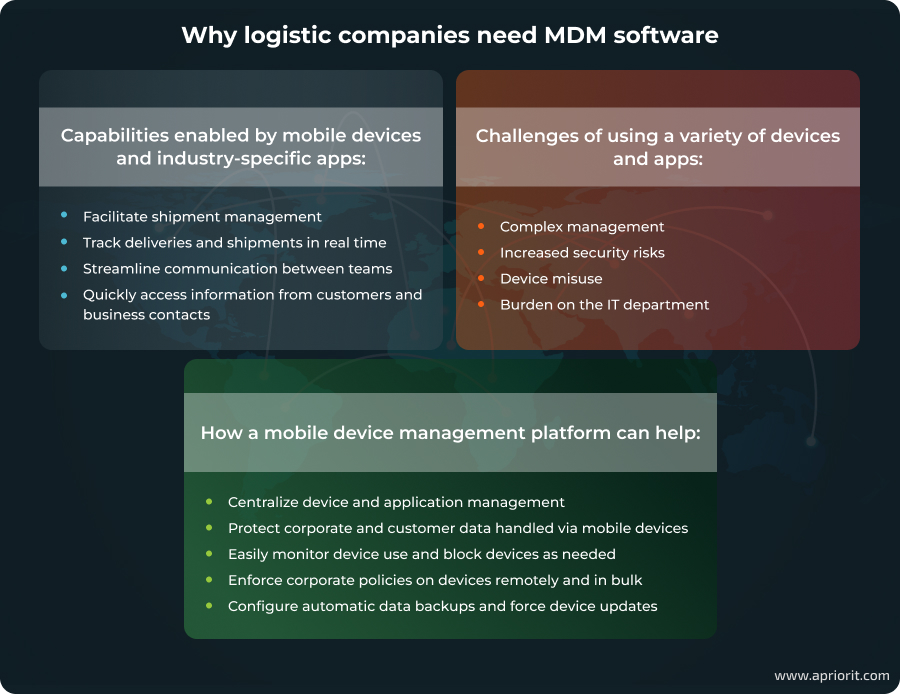
Mobile device management for logistics helps your IT teams efficiently and conveniently secure devices, apps, and the data they store and process. For instance, your admins can easily monitor device usage, enforce corporate policies on devices remotely and in bulk, force firmware and software updates, and configure automatic data backups.
No wonder interest in MDM software is rising across different industries. The mobile device management market is expected to grow from $10.86 billion in 2024 to $13.54 billion in 2025. The main drivers of this growth are security and compliance requirements, enterprise mobility and productivity, remote workforce management, and application management needs.
In the next section, we analyze how exactly logistics and transportation companies can leverage MDM software and what benefits it may bring them.
Struggling with managing a fleet of mobile devices?
Simplify mobile device tracking and enhance data security by having expert Apriorit engineers develop a custom MDM system tailored to your objectives.
How to apply MDM in logistics and transportation: Use cases and benefits
Let’s see the main MDM use cases and the benefits they bring to the logistics and transportation industry:
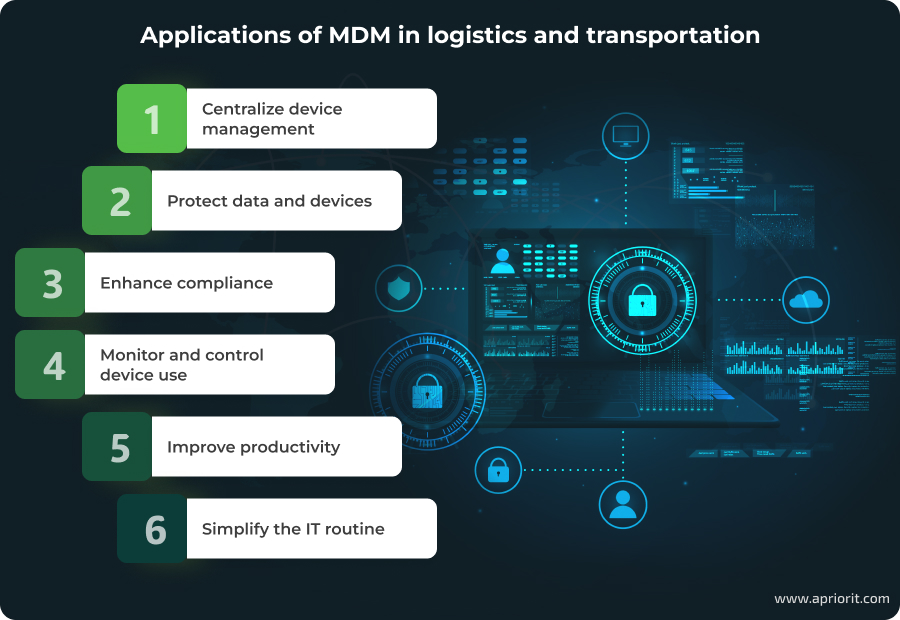
1. Centralize device management
MDM software allows an IT team to manage the full variety of enrolled devices from a single platform over the air. This way, you ensure that all workers can smoothly perform their duties without any blockers.
This capability is essential for logistics and transportation companies, as many employees work remotely most of the time. Manually installing and configuring specific tools and apps would take too much time and disturb work processes.
The range of remote management capabilities includes:
- Pushing preconfigured enterprise apps
- Enforcing device settings and web shortcuts
- Troubleshooting
- Updating software and firmware
- Changing app and device configurations
MDM software also offers flexible device management. With a logistics-centered solution, admins receive granular control over all device settings, along with capabilities to customize configurations based on specific employee roles. Thus, you can push different settings and access rights to drivers, customer managers, and warehouse staff depending on what they need to perform their tasks.
By distributing different sets of policies to different groups of users instead of manually setting policies for each individual device, IT teams enhance operational efficiency and ensure that devices are used optimally.
2. Protect data and devices
By managing device settings and app distribution centrally, companies can ensure that all devices are protected against potential vulnerabilities.
You can also protect sensitive information by remotely wiping data and deactivating a device if it’s lost or stolen. Such features provide an additional layer of security, allowing you to maintain your cybersecurity posture even in the event of a security breach. Likewise, your IT teams can ensure automated blocking of malicious URLs.
Additionally, IT admins can use VPN tools built into MDM software to secure communications. Control over device functionality like cameras, Wi-Fi, and GPS tracking might help to minimize the risks of device misuse.
3. Enhance compliance
MDM solutions assist companies with adhering to different policies and standards. For example, enforcing predefined configurations and policies across all corporate devices increases data protection.
Depending on the services they provide and the types of cargo they handle, logistics companies can be obliged to meet requirements of different bodies and standards:
- Occupational Safety and Health Administration (OSHA)
- Environmental Protection Agency (EPA)
- Department of Transportation (DOT) – specifically, the electronic logging device (ELD) rule
- Data protection and privacy laws like the General Data Protection Regulation (GDPR) and Payment Card Industry Data Security Standard (PCI DSS)
Logistics companies can also use detailed reporting and analytics capabilities provided by MDM software to monitor compliance, identify potential issues, and fix them before they become major problems. Insights from such data analysis enable companies to take proactive measures to address compliance challenges and reduce the risk of costly penalties.
Related project
Developing a Custom MDM Solution with Enhanced Data Security
Discover how Apriorit developed a secure product for managing Android tablets in enterprises, helping our client keep sensitive data secure and provide a new range of services.
4. Monitor and control device use
MDM solutions collect information about enrolled devices, enabling companies to track the use of devices, apps, and the data they store and process. This allows your admins to spot suspicious activity and enforce rules denying certain actions.
Most MDM solutions provide real-time GPS tracking for devices used in various transport types and logistics facilities. Companies can leverage this data to optimize delivery routes and monitor driver performance. Potentially, analysis of tracking data can also help to reduce fuel consumption and improve the efficiency of delivery operations.
Some MDM solutions might also include extra features like driver safety monitoring to help transportation companies ensure drivers’ safety. For example, you can:
- Automatically disable the touch screen according to your company’s policies: once a vehicle achieves a certain speed or at a certain time
- Restrict access to distracting applications while driving, or issue safety alerts if a driver interacts with a device on the road
- Enforce responsible driving practices and enhance overall safety in logistics operations
5. Improve productivity
Another essential use case of MDM software is keeping employees engaged and focused during work hours. Thanks to kiosk mode, which is a must-have feature, admins can restrict devices to only run business apps and block distracting applications and websites.
For example, you can restrict warehouse staff to using only work-related and communication apps, preventing them from scrolling social media during their shifts. This helps you make sure that corporate devices are used for work purposes, minimizing distractions and enhancing productivity.
Another benefit of a well-designed MDM solution is an improved user experience for employees. You can tailor the user experience to employees’ specific operational needs and requirements by minimizing the number of apps. This will also reduce the learning curve for new users and prevent potential human errors.
6. Simplify the IT routine
With a variety of features, MDM solutions seem like complex IT products. However, such software becomes a convenient and valuable tool for your IT teams, allowing them to uniformly configure all devices with minimal manual work. MDM solutions significantly reduce the burden on your admins by offering benefits like:
- Easier and faster configuration of new devices. Once a new smartphone or tablet is enrolled, all the apps, configurations, and settings automatically get pushed according to policies designed for a specific user group.
- Advanced maintenance. Admins can remotely update operating system versions for all devices, ensure the latest versions for critical applications, and install security patches and other vital updates in a timely manner.
- Custom app distribution. An IT team can easily deploy proprietary tools designed for specific operational needs, providing employees with access to all the tools needed to perform their tasks.
With key use cases and benefits in mind, let’s take a closer look at specific functionality.
Read also
MDM vs MAM: Which to Choose for Your Business
Optimize your mobile security strategy. Understand the strengths of MDM and MAM and choose the best approach for managing devices and apps.

Essential MDM functionality for logistics
Below, we highlight the most helpful features for the majority of businesses operating in logistics and transportation:
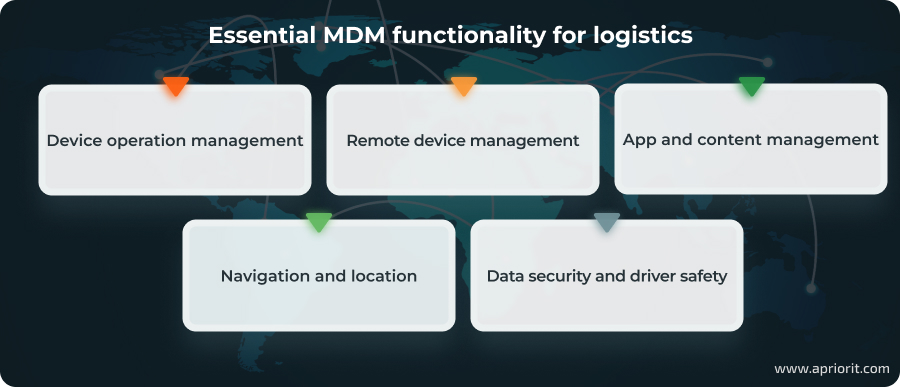
Device operation management
- Quick enrollment allows your IT team to configure and enroll devices in MDM during device setup. With this feature, your admins can quickly deploy business policies, configurations, apps, content, and security restrictions in bulk, saving time when onboarding new team members.
- Inventory helps your admins effectively manage the device fleet by receiving complete visibility into all of the company’s devices and installed software. With this feature, IT staff can proactively monitor the status of the device fleet, track software versions, and plan necessary updates, ensuring smooth operations at every link in your logistics chain.
- Containerization allows your IT department to separate restrictions in case an organization has a Bring Your Own Device (BYOD) policy. With this feature, admins create a work container on BYOD devices to isolate business resources from personal data. Such a container can be encrypted, protected with a strong password, and secured through actions such as disabling copy/paste and screenshot features.
- Device health monitoring helps your IT teams track parameters like battery level, signal strength, memory use, network information, and data limits. This feature can come along with a unified dashboard that conveniently shows all information organizations need to know about devices.
- Reports allow your employees to retrieve comprehensive device information on data consumption, text messages, call logs, location history, etc.
Remote device management
- Remote support allows IT admins to view the device screen and offer real-time assistance. Whether users are in warehouses or on the road, such a feature helps logistics businesses identify technical issues, troubleshoot in real time, deploy configurations, and manually perform remote updates.
- Device blocking and data wiping helps your team to quickly react in case a device experiences a security breach or gets lost or stolen. IT admins can wipe data completely or selectively, depending on the situation.
- Provisioning allows your employees to save time on manual network configuration. For example, while an employee moves between multiple warehouses, the MDM solution can take care of automatically connecting to each Wi-Fi network.
- Content distribution provides employees with easy access to business documents and agreements for better productivity. Such a feature helps IT admins push, copy, and delete files and folders from devices remotely.
- Message broadcasting assists in notifying employees about important updates and critical instructions. A message can pop up in the center of the screen so it’s immediately seen.
App and content management
- Kiosk mode provides logistics organizations with powerful control tools: restrict access to applications and URLs, limit access to system settings and configurations, and prevent users from accessing any features or functions outside the established policies.
- Simplified application deployment ensures that each driver or operator can access the necessary applications remotely, upon their request, with a single click.
- In-bulk app distribution serves for pushing applications required for certain user groups or all employees. IT admins can silently install allowed applications with no user intervention.
- Application management assists in updating apps remotely on managed devices, retrieving reports on app deployment status, uninstalling apps, and preventing employees from installing non-approved third-party applications.
- Website allow-lists and deny-lists help IT teams ensure that user access is only allowed to approved websites. Along with an MDM app, admins can install a browser of their choice and block/remove other browsers.
- Custom branding helps companies customize kiosk mode with the organization’s logo, values, and banners for a more professional look.
Navigation and location
- Navigation continuously provides precise device geolocations using GPS tracking, offering instant visibility into routes taken and providing data for future route management.
- Geofencing allows logistics companies to set up virtual perimeters that restrict device use to specific locations. If a device moves beyond configured boundaries, it’s flagged as non-compliant and predefined security policies are automatically enforced. IT administrators are also notified immediately, allowing them to take quick action. This helps protect confidential data by preventing access outside designated areas.
Data security and driver safety
- Touch blocking while driving prevents distractions and accidents, enhances driver safety, and complies with road safety standards. With this feature, transportation companies can lock a device’s screen once a certain speed is reached.
- Mobile data and Wi-Fi restrictions allows IT teams to set limits on mobile and Wi-Fi data use on deployed devices in order to enhance employee productivity and safety.
- Data sharing restrictions prevent employees from sharing confidential data with unauthorized people by disabling USB connections, screen sharing functionality, Bluetooth, messages, etc.
- Role-based access allows admins to make sure only authorized users can access corporate apps and data by designating various roles with certain privileges to different user groups.
- Alert functionality provides IT staff with instant alerts on situations that demand quick reactions: rooting or jailbreaking attempts, unauthorized device access, etc. This functionality relies on notification rules, so your admins can set specific rules to focus on the most important things and prevent notification fatigue.
Different logistics organizations are likely to look for different capabilities, as their business processes and services differ. As a result, you might find yourself in need of additional functionality. If you are using an off-the-shelf solution, consider requesting custom feature development from a software provider. Or, if you’re ordering a custom MDM system, ask your software development vendor to plan specific functionality from the very beginning.
Related project
Enhancing an MDM Platform with a Custom Audio Player in a Continued Partnership
Get the details on how we created a custom audio player with advanced features and seamless performance tailored to meet our client’s unique requirements.

Which MDM to choose: Ready-made vs custom
Once you’ve decided to enhance your device fleet management and data security with an MDM solution for logistics, another choice your business faces is whether to use an off-the-shelf product or build custom software.
Let’s discuss the pros and cons of each approach to figure out what would work best for you.
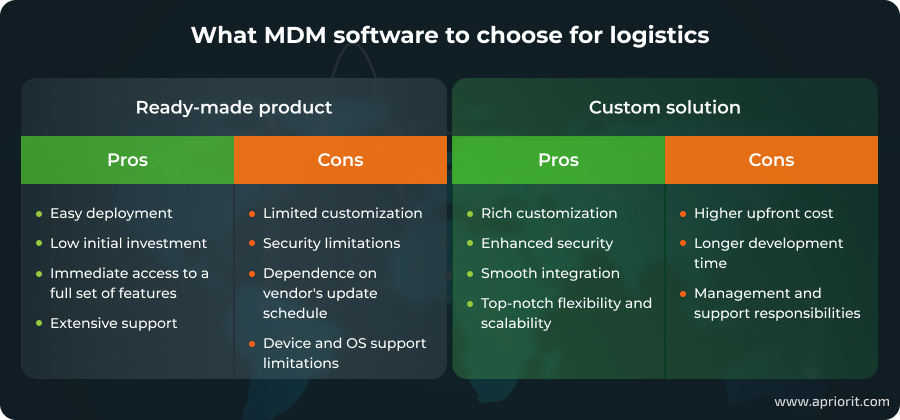
Ready-made MDM solutions seem a convenient option, as they are easy to deploy and start using. You can request demo versions from various providers and choose the one that best fits your business needs and technical requirements.
While MDM providers offer different monthly or yearly subscriptions for different feature sets, you receive the chosen functionality all at once; and the prices are affordable for many logistics organizations.
Last but not least, MDM providers usually offer guidelines, instructions, detailed FAQs, and helpful chatbots, ensuring quick and efficient support in case your IT department has troubles with installing, configuring, or using the product.
On the downside, off-the-shelf solutions have limited customization options. Such software solutions usually target multiple industries, offering generic capabilities. Some MDM providers offer to develop custom features or customize existing features to meet logistics needs, but this takes time and costs more. Another disadvantage is a limited number of security mechanisms your team ends up with when using an off-the-shelf solution.
Though MDM providers tend to regularly update their products and fix discovered vulnerabilities and inefficiencies, they do this according to their own schedule, and you have no control over it. You have to patiently wait for features that may be important for your business to be added or fixed. Also, many MDM systems have limitations regarding the range of devices and operating systems they cover, mostly targeting Android devices only. If your business has devices running iOS, Linux, or custom-built operating systems, off-the-shelf solutions might not meet your needs.
Custom MDM solutions offer your logistics business almost unlimited capabilities and can be adjusted to your unique workflows and devices.
Another huge benefit is the ability to add advanced data and device protection measures, meeting your security and compliance needs.
Since a software development vendor will create a custom MDM solution solely for your business, they can take into account your corporate infrastructure and different systems used for customer management, warehouse management, transportation management, etc. This way, you can ensure smooth MDM integration with existing systems within the corporate environment. Also, you’ll get a solution that is flexible and scalable to support your business’s current needs and plans for future growth.
By building a solution from scratch, you can have a software development vendor take into consideration all the demands of your IT admins and field employees, ensuring a top-notch user experience and productivity.
The main downside of custom MDM development is the high upfront investment. However, in the long run, your own software will be more cost-effective than an off-the-shelf product, as you won’t have ongoing subscription costs.
Another disadvantage is that creating a custom solution takes at least a few months, as your development vendor has to elicit your requirements, conduct research, prepare an offer, and discuss crucial details before starting the actual coding.
Also, when requesting a custom solution solely for your business needs, you add support and maintenance responsibilities to your IT department’s task list. If your software development vendor offers such services, you can delegate the support activities.
In summary, ready-made solutions are ideal for small to midsize logistics companies looking for quick deployment and cost savings. Custom solutions are better suited for larger companies or those with unique operational needs that cannot be met by off-the-shelf products.
Read also
How to Build a Mobile Device Management (MDM) System
Find out how to receive a top-notch MDM system. Explore key aspects of building a secure and efficient mobile device management solution from the ground up.

How Apriorit can help you build an MDM logistics solution
Custom software is the best way to elevate your mobile device fleet management and streamline logistics and transportation operations. Apriorit engineers will gladly outline the optimal functionality set, choose proven technologies, and deliver an MDM system that exceeds your expectations.
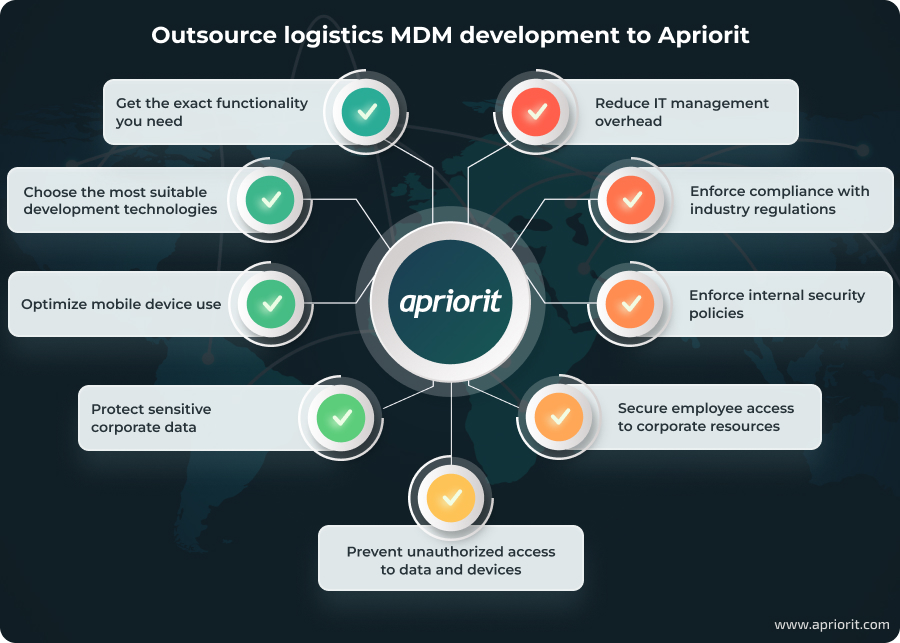
From building parental control apps to developing highly secure MDM solutions, we know exactly how to create software that aligns with our clients’ business needs.
Whatever requirements you have in mind, our experts will gladly turn your vision into a real-life IT solution. When outsourcing MDM development to Apriorit, you get:
- Thorough project preparation. We accurately plan all components and features, offer suggestions, and double-check every crucial detail. This way, you’ll get the exact functionality your business needs and avoid unexpected expenses and prolonged deadlines. If your company uses Internet of Things devices or blockchain-based solutions, we’ll take that into account to make sure your logistics MDM solution smoothly integrates into your corporate environment.
- Strong focus on security. At early project stages, our specialists outline all types of data to protect, identify possible risks to eliminate, and finalize security measures to implement throughout MDM development. No matter the range of services your logistics company offers, we’ll make sure to cover all data and device types with advanced cybersecurity measures. Apriorit engineers prioritize secure software development lifecycle practices to make sure your product is protected at every stage of development.
- Powerful traffic filtering. This is a crucial part of any MDM solution, as it helps restrict access to suspicious or malicious websites and applications. We’ll make sure that your MDM solution is thoroughly protected thanks to our rich experience developing and implementing traffic filtering features.
- Custom API and VPN development. MDM APIs transmit sensitive corporate, customer, and shipment data, so it’s essential to make sure that only trusted agents can access them. At Apriorit, we create protected and efficient custom APIs and make sure no unapproved third-party apps can interact with them. We also develop custom VPN services to help secure access to corporate data on mobile devices used in logistics operations.
- Tailored user experience. During the project discovery phase, we research the needs and concerns of end users. We’ll not only make sure your final product is efficient and secure but also streamline productivity without distracting employees thanks to wise UI/UX design.
Overcome the complexity of logistics and transportation processes by leveraging innovative technologies and building smart solutions that work to your benefit. From business analysis and development to deployment, support, and maintenance, Apriorit will ensure the highest quality at each step.
Conclusion
Industry-tailored MDM software is perfect for logistics and transportation companies. Such solutions protect business-critical and sensitive data across mobile devices used by all parties, from drivers and warehouse staff to operational managers and customer support. Implementing an MDM solution into your corporate ecosystem ensures continuity of processes in an industry where speed and teamwork are crucial.
To get the most out of your mobile device management practices, make sure to deploy a solution with relevant features and advanced security measures. Apriorit’s engineers are ready to assist you with developing custom MDM software tailored to your objectives and requirements.
Ready to elevate your business with a custom MDM solution?
Leverage Apriorit’s skills and experience to build MDM functionality that streamlines mobile device management, keeping your data secure and your operations running smoothly.


